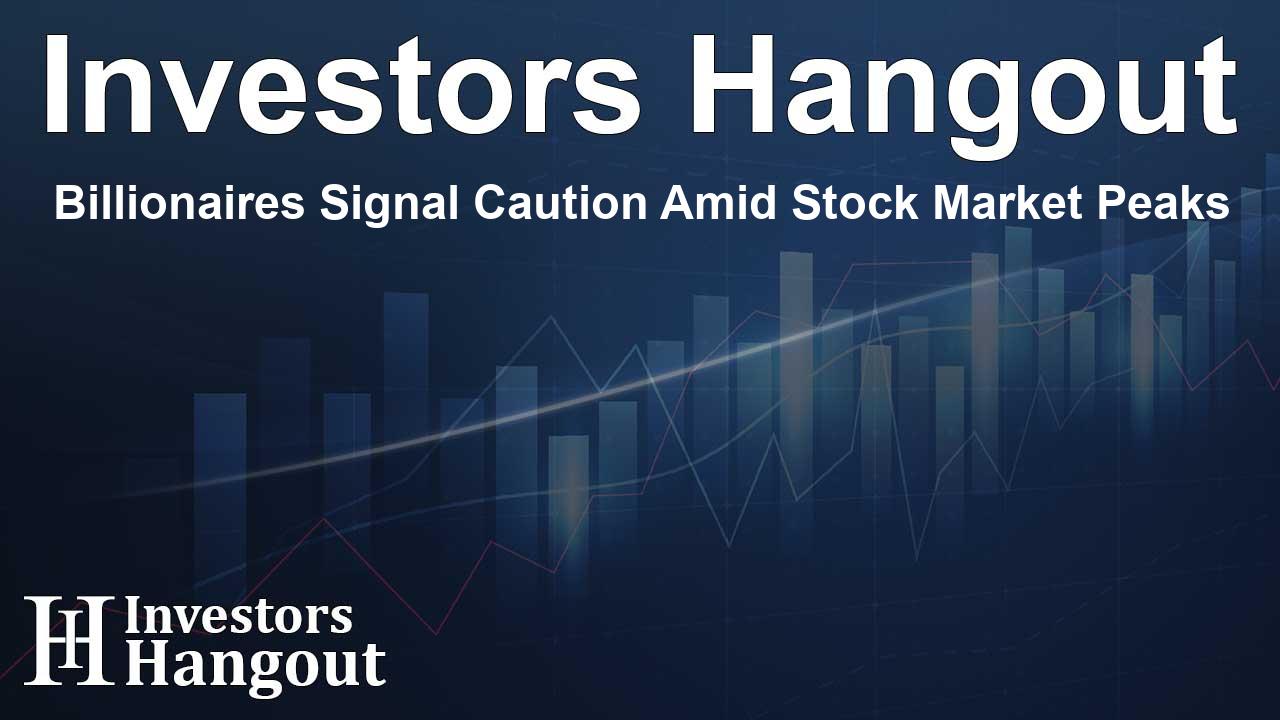Billionaires Signal Caution Amid Stock Market Peaks

A Century of Stock Market Dominance
For the past hundred years, stocks have enjoyed a superior position compared to other asset classes. While various investments, such as Treasury bonds, real estate, and commodities, have provided positive returns, none compare to the average annual returns generated by stocks. This historical outperformance is significant, yet stock indexes do not consistently move upward on a straight trajectory.
In 2024, the legendary Dow Jones Industrial Average (DJINDICES: ^DJI), the esteemed S&P 500 (SNPINDEX: ^GSPC), and the growth-centric Nasdaq Composite (NASDAQINDEX: ^IXIC) achieved record closing highs multiple times. However, recent actions from established investors suggest underlying caution in this market.
Warnings from Value Investors
With the rise of artificial intelligence, an improving economy, and favorable monetary policies, there seems to be an encouraging atmosphere for stock investment. Yet, some of the most accomplished billionaire investors are selling stocks, which raises eyebrows.
Warren Buffett, the CEO of Berkshire Hathaway, is a prime example of a value-focused investor. Known as the Oracle of Omaha, Buffett is strategic about his investments, often waiting for optimal moments to capitalize on market inefficiencies.
So far in 2024, Buffett and his team have sold nearly $132 billion in equities. The firm is currently holding an incredible $276.9 billion in cash and liquid assets, reflecting a cautious approach in what many perceive as a peak market.
Other Notable Investors
Buffett is not the only prominent investor signaling caution. Bill Ackman from Pershing Square Capital Management also fits this narrative. Although he recently acquired shares in Nike and Brookfield, he sold off sizeable positions in companies like Alphabet and Chipotle Mexican Grill.
Terry Smith, often dubbed the "Warren Buffett of Britain," showed similar tendencies. During the last quarter, he significantly reduced his stakes in most of his portfolio, highlighting a retreat from high-risk assets.
David Tepper of Appaloosa Management also demonstrated caution, trimming down his growth stock holdings significantly, including well-known names such as Nvidia and Microsoft.
Historic Valuation Concerns
Investors have varied interpretations of 'value' based on their perspectives. However, the current state of stock valuations raises alarms. Presently, the stock market is perceived as one of the most expensive in history, echoing sentiments from the 1870s.
The price-to-earnings (P/E) ratio serves as a traditional method to evaluate stock value; however, it can often give a skewed perspective, especially during unprecedented events, such as the COVID-19 pandemic. A more reliable metric for understanding valuation trends is the Shiller price-to-earnings ratio (CAPE ratio), which utilizes a decade of inflation-adjusted earnings.
Historically High Shiller P/E Ratios
The Shiller P/E ratio for the S&P 500 has averaged 17.16 since 1871, but for the last three decades, it has predominantly remained above this threshold. As of now, it has exceeded 30, indicating a troubling trend. Historically, when Shiller P/E ratios exceed this benchmark, equity markets face significant downturns, losing at least 20% of their value shortly after. Such instances, appearing only six times in 153 years, justify the apprehensions of astute investors.
Smart Strategies for Investment
Market analysts often highlight the importance of being cautious during peaks. The recent selling behavior from notable investors may not just signify profit-taking - it likely reflects deeper concerns regarding market sustainability.
As a savvy investor, having capital reserves can be advantageous. Industry veterans such as Buffett, Ackman, and Tepper understand the potential for future price dislocations in the market. Thus, holding cash or low-risk investments might be wise as they assess the risk versus reward equation moving forward.
Frequently Asked Questions
What are the key indicators of stock market health?
Key indicators include the performance of major stock indexes, valuation metrics like the Shiller P/E ratio, and buying/selling activities of significant investors.
Why are billionaire investors selling stocks?
Billionaire investors may sell stocks in response to high market valuations and to increase cash reserves for better investment opportunities later.
How does the Shiller P/E ratio compare to traditional P/E ratios?
The Shiller P/E ratio accounts for inflation and averages earnings over a decade, making it less susceptible to short-term fluctuations compared to conventional P/E ratios.
What does high valuation mean for investors?
High valuation typically indicates overvaluation, meaning stocks may be overpriced and could face corrections, leading to potential losses for investors.
What are some strategies for investing in a high-risk market?
Strategies include diversifying investments, holding cash reserves, focusing on value stocks, and avoiding panic selling when the markets decline.
About The Author
Contact Caleb Price privately here. Or send an email with ATTN: Caleb Price as the subject to contact@investorshangout.com.
About Investors Hangout
Investors Hangout is a leading online stock forum for financial discussion and learning, offering a wide range of free tools and resources. It draws in traders of all levels, who exchange market knowledge, investigate trading tactics, and keep an eye on industry developments in real time. Featuring financial articles, stock message boards, quotes, charts, company profiles, and live news updates. Through cooperative learning and a wealth of informational resources, it helps users from novices creating their first portfolios to experts honing their techniques. Join Investors Hangout today: https://investorshangout.com/
The content of this article is based on factual, publicly available information and does not represent legal, financial, or investment advice. Investors Hangout does not offer financial advice, and the author is not a licensed financial advisor. Consult a qualified advisor before making any financial or investment decisions based on this article. This article should not be considered advice to purchase, sell, or hold any securities or other investments. If any of the material provided here is inaccurate, please contact us for corrections.
